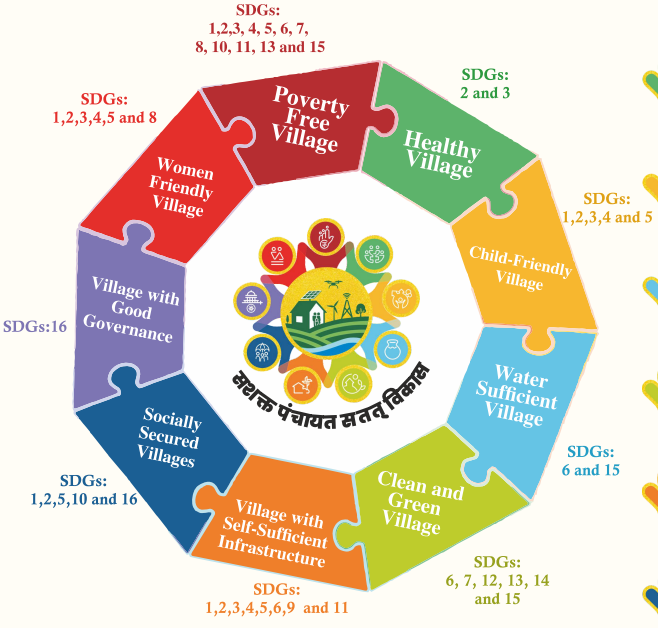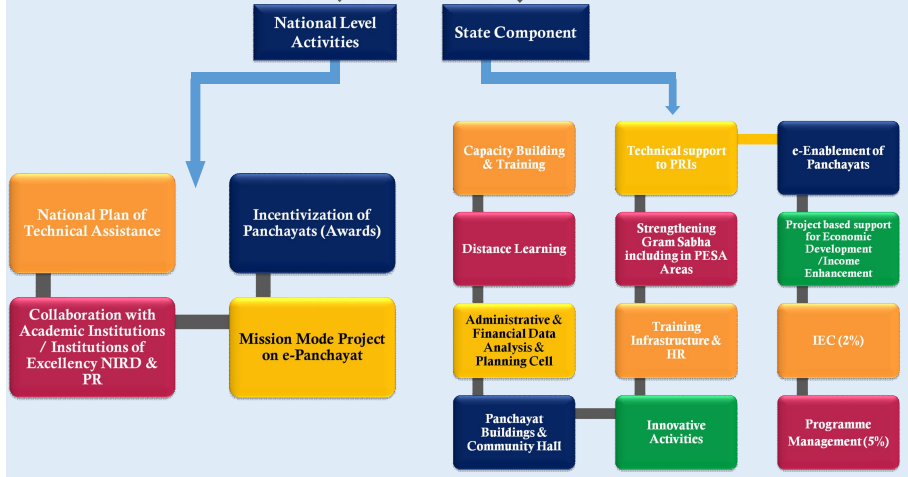Rashtriya Gram Swaraj Abhiyan
Rashtriya Gram Swaraj Abhiyan
Rashtriya Gram Swaraj Abhiyan (RGSA) was launched on 24th April 2018 as an umbrella scheme of the Ministry of Panchayati Raj, Govt. of India. It is a unique scheme proposed to develop and strengthen the Panchayati Raj System across India in the rural areas implemented during 2018-19 to 2021-22.
The scheme was revamped and the Centrally Sponsored Scheme of Revamped Rashtriya Gram Swaraj Abhiyan (RGSA) was approved for the implementation from financial year 2022-23 to 2025-26 for capacity building of elected representative of Panchayati Raj Institutions (PRIs). The primary objective of Revamped RGSA is to develop the governance capabilities of the Panchayats to deliver on Sustainable Development Goals (SDGs) which covered within the purview of Panchayats.
Objectives of revamped RGSA
 Develop governance capabilities of Panchayati Raj Institutions (PRls) to deliver on the Sustainable Development Goal (SDGs);
Develop governance capabilities of Panchayati Raj Institutions (PRls) to deliver on the Sustainable Development Goal (SDGs);- Focus on developing the capacity of elected representatives of PRis for leadership Roles to enable the Gram Panchayats to function effectively as third tier of Government;
- Enhance capabilities of Panchayats for inclusive local governance with focus on optimum utilization of available resources and convergence with other schemes to address the issues of national importance;
- Enhance capabilities of Panchayats to raise their own source of revenue;
- Strengthening Gram Sabhas to function effectively as the basic forum of people's participation within the Panchayat system.
- Promote devolution of powers and responsibilities to Panchayats according to the spirit of the Constitution and PESA Act 1996;
- Strengthen institutions for capacity enhancement of PRis at different levels; collaborate with other Departments & stakeholders for optimal use of available training infrastructure to ensure quality standards in infrastructure facilities, human resources and outcome based training;
- Collaboration with Academic Institute/ Institute of Excellence to support capacity building and hand-holding for PRis;
- Promote e-governance and other technology driven solutions to enable good governance in Panchayat administrative efficiency and improved service delivery with transparency and accountability;
- Recognize and incentivize the performance of PRis towards attainment of SDGs;
- Enhance capabilities of Panchayats through action research and publicity to reach out to multiple and diverse target groups and taking up research studies related to PRis for assessments and informed policy decisions;
- Exchange of information/ideas through international organisations and exchange programmes in local governance
Coverage
The Revamped RGSA extends to all States and Union Territories (UTs) of the country including institutions of rural local government in non-Part IX areas, where Panchayats do not exist.
Focus areas of RGSA
- To ensure:
- Basic orientation training for the Elected Representatives (ERs) of Panchayats, within 6 months of their election;
- Refresher training to be ensured within 2 years; Strengthening of Panchayat-SHG convergence;
- Training at State, District and Block/Cluster of GPs level for ERs and PF, Resource persons, Trainers/ Master Trainers etc. on various aspects of PRis with focus on e Governance and LSDGs following thematic approach;
- Physical/ Virtual/online and hybrid mode of trainings leveraging emerging technologies such as Augmented Reality (AR), Virtual Reality (VR) Metaverse etc. to ensure interactive Capacity Building and Training activities and facilitate anytime anywhere self-learning and self-certification, with focus on practical approach; Standardisation of Training Needs Assessment, Training Modules, training materials, training of Master Trainers and Impact Assessment of training programmes;
- Training of additional Trainers/ Master Trainers in 9 thematic areas for localisation of SDGs;
- Leveraging the Institutes of excellence/ reputed institutions for capacitating ERs for leadership roles at all tiers of Panchayats and other such activities;
- Building of Capacity of PRis on digital literacy.
- To bridge gaps in:
- Capacity Building and Training (CB&T);
- Gram Panchayat infrastructure with focus on NE States;
- Use of lT for distance learning & for e-Enablement of Panchayats;
- Institutional support for innovative activities;
- Gap filling support of Economic Development & Income Enhancement projects;
- Technical support including Human Resource (HR) to strengthen Panchayat Resource Centres;
- Hand-holding support for GPDP formulation by Academic Institutions/Institutions of excellence/ CSO/CBOs/NGOs (registered at NGO Darpan ofNITI Aayog).
- e-enablement of Panchayats fore-governance to enhance efficiency and transparency with thrust on integration of Applications developed by the Ministry.
- Facilitate Electronic Fund Transfer (EFT), Public Finance Management System (PFMS) and Geotagging of assets in Gram Panchayats.
- Facilitate renting of office space for SPRS/DPRC/BPRC and hiring of training infrastructure for short term basis at District and Block level.
- National component for setting protocols and building capacities.
Actvities to by supported

Expected outcomes of RGSA:
- Enhanced capabilities of Panchayats for good governance and attainment of Sustainable Development Goals (SDGs) adopting 9 thematic approach through participatory local planning, democratic decision-making, transparency and accountability.
- Increased use of e-governance and technology driven solutions at the Panchayat level to attain administrative efficiency, improved service delivery & greater accountability.
- Building Institutional structure for capacity building at the National, State, District and Block levels with adequate infrastructure, facilities and human resources.
- Strengthen PRis and empower Gram Sabhas to function as effective institutions with social inclusion of citizens particularly the vulnerable groups.
- Strengthen Standing Committees in localisation of SDGs and to realise the concept of Vibrant Gram Sabha through preparation of sector/theme wise plans.
- Strengthening PRis to promote equity and inclusiveness, along with Social Justice and economic development of the community, as Panchayats have representation of Schedule Caste, Schedule Tribes and women, and are institutions closest to the grass roots.
- Panchayats will progressively be strengthened through Incentivisation on the basis of nationally important criteria which will encourage competitive spirit among them
- Enhanced capabilities of Panchayats for good governance and attainment of SDGs through participatory local planning, democratic decisionmaking, transparency and accountability.
- Increased use of e-governance and technology driven solutions at the Panchayat level to attain administrative efficiency, improved service delivery & greater accountability.
- Building Institutional structure for capacity building at the National, State & District levels with adequate infrastructure, facilities and human resources.
To access the complete scheme guidelines and the progress made, click here.
Source : Ministry of Panchayati Raj
Last Modified : 8/14/2024
This topic provides information about National Pan...
Provides information about Carbon Neutral developm...
